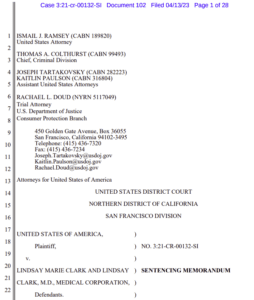The best sentencing memorandum we’ve ever seen
When medical professionals endanger patients with unsafe medicine, they face consequences in three venues. They are prosecuted for criminal charges like receipt and delivery of misbranded and adulterated drugs and devices. While those cases work their way through the courts, however, licensing boards and lawyers representing patients await their outcomes.
When medical licensing boards take up cases, they face some real challenges. If a professional’s conduct was so egregious that they plead guilty, the board has an obligation to determine how and whether to discipline them. Cases resolved without trials, however, may leave almost no public evidence and independent investigations are costly for licensing boards. One way to address this issue is for prosecutors to build the evidence of wrongdoing into their sentencing memorandum. This allows subsequent parties—the licensing board, but also patient victims—to see the full scope of conduct that endangered the patients.
USA v. Lindsay Marie Clark and Lindsay Clark M.D. Medical Corporation
The government’s sentencing memo for USA v. Lindsay Marie Clark and Lindsay Clark, M.D., Medical Corporation (NO. 3:21-CR-00132-SI, U.S. District Court, Northern District of California) is one of the best examples of this approach that we’ve ever seen. The physician’s conduct was so blatant that she pleaded guilty on behalf of herself and her medical practice and in arguing for a custodial sentence, three Department of Justice attorneys, Joseph Tartakovsky, Kaitlin Paulson, and Rachael Doud, laid out the details of the case in a way that will really benefit California’s medical board when they take up their decision.
About this case
"Doctor Pleads Guilty to Using Misbranded and Adulterated Products Sold as Botox and Juvederm," U.S. Department of Justice, November 28,2022
Indictment, USA v Lindsay Marie Clark, April 1, 2021
Sentencing Memo, USA v Lindsay Marie Clark April 20, 2023
“And this wasn’t occasional conduct but the cornerstone of her business model: Clark’s records reveal that between 2016 and 2020 she purchased at least $270,951 in products from these foreign suppliers and earned at least $1,069,880 in injecting them into patients.”
The memo stops the licensed professional from minimizing their conduct as a simple mistake.
The first thing any defense attorney will try to do is minimize the defendant’s conduct as a one-time mistake. By including the scope of the crime, the attorneys demonstrated that Dr. Lindsay Clark did not simply make a mistake, but built a business model on the crime. As the medical board decides if she should be allowed to continue to practice, this is an excellent data point that suggests a strong sanction may be required.
“Clark’s staff all confirmed that the practice purchased products from these sources at Dr. Clark’s sole direction. Clark PSR ¶ 18; LCMC PSR ¶ 17. They also confirmed that patients who received these products were charged the same amount as patients who received products obtained in compliance with the law (and that cost Clark significantly more)."
It documents the licensed professional's personal accountability for the crime.
Prosecutors collected and presented evidence that Dr. Lindsay Clark personally directed her staff to purchase misbranded medical products and to conceal them from patients, the manufacturer, and the Food and Drug Administration officials. This is important: without other evidence a medical professional could claim that a member of their staff had a key role in the crime in order to minimize licensing board sanctions on themselves.
"The FDA sent Notices of FDA Action to the practice on eight occasions between April 2017 and March 2018... Dr. Clark denies having seen any of the notices at the time, Clark PSR ¶ 36, but the evidence suggests that Clark was at a minimum aware of them when they were received by her practice but chose to ignore them. First, an employee recalled seeing at least one of these FDA notices and her recollection was that she gave it to Clark."
And shows that the professional was given every opportunity to correct their behavior.
Whether or not Dr. Lindsay Clark had opportunities to stop her criminal behavior is an important factor that the medical board will take into account when considering sanctions. The FDA sent Dr. Lindsay Clark eight separate notices. While she claimed not to see them, the sentencing memo documents that DOJ attorneys interviewed Dr. Clark’s staff, one of whom told them that they gave the FDA notice to Dr. Clark.
Conclusion
Law enforcement, licensing boards, and even malpractice attorneys have a role to play in protecting patients. Medical boards have fewer resources to conduct investigations than federal prosecutors do. Prosecutors can ensure that boards and patient attorneys have ample evidence necessary to do their jobs by putting as much of it as possible into a sentencing document. For cases where there has not been a trial, this is doubly important: prosecutors can provide evidence for subsequent legal and administrative work that will help refute defense attorneys’ claims of innocence if they wish to use an obscured record to their inappropriate advantage..
